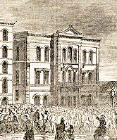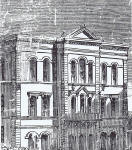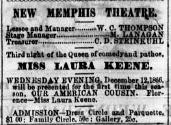| |
|
CRISP'S
GAIETY . NEW
MEMPHIS . MEMPHIS . LEUBRIE's |
| |
| NEW MEMPHIS
THEATRE
.
82
Jefferson Av |
|
| |
|
 |
|
Theatre |
|
MEMPHIS, NEW MEMPHIS, CRISP'S
GAIETY and
LEUBRIE'S are all
associated with the 82 Jefferson address. For a very long time,
the theatre building at 82 Jefferson was considered the most
important theatre of Memphis and more often than not, it was
written about as "The Old Memphis" even when the article might
be about "The New Memphis" or "Leubries Theatre".
That practice created major problems for the modern day historian.
To further confuse the issue, there was already ANOTHER
"Memphis" Theatre at 18 Washington Avenue, and when this "New
Memphis" Theater opened, the first Memphis Theatre soon began calling itself the "Old
Memphis". |
|
| |
|
We do
apologize for the confusion that is bound to happen as we try to
keep the many names of the two theatres accurate. It's not an
easy task. |
|
|
The
location of the Memphis Theatre was "on Jefferson, near
3rd, or on NE corner of Jefferson/3rd", according to the
Memphis Directories.
The theatre's name changed every time a new
manager took over or when the theatre was renovated. The
sequence of names was
Crisp's Gaiety . New Memphis Theatre .
Memphis Theatre . Leubrie's Theatre . New Memphis Theatre.
It's no wonder that the newspapers gave up and simply called
it "The old Memphis Theatre", But of course that
caused more confusion because that OTHER Theater on Washington
called themselves "Old Memphis". . |
 |
| |
Jefferson near
3rd |
|
| |
|
 |
CRISP'S GAIETY THEATRE .
Listed in the 1857-59 Memphis
Directories. The
Jefferson theatre was originally constructed in 1857 by James Wickersham and
opened briefly as the "New Memphis Theatre". He
built the lavishly decorated
theatre at a cost of $40,000 and it was the first Memphis
building constructed for the sole purpose of a theatre.
It was soon leased by W. H. Crisp who re-opened the new theatre under the name of
"Crisp's Gaiety Theatre. It was very successful
in its inaugural year and famed opera diva Jenny Lind first sang
in Memphis at Crisp's Gaiety. After a short
tenure Crisp left Memphis by 1960 to enlist in the Confederate
army. |
|
W. H. Crisp |
|
|
|
Before leasing the "New Memphis" Theatre, W. H. Crisp had
previously been associated with that other theatre on Washington
Avenue between Main and Front. Of course its name was
"Memphis". (Are you confused, yet?
You will be) |
|
|
 |
 |
 |
 |
 |
 |
| Jenny Lind
|
Crisp's
Opens - 1857 |
Ad - 1857 |
Nashville
1858 |
Nashville
1858 |
Ad - 1859 |
|
|
William H.
Crisp
was married to Eliza, also an actor. Together they
traveled to theatres in Tennessee, Georgia, Louisiana, and
Texas. William generally managed-leased the theatres and
they both performed. They had a son, Charles F. Crisp.
Although Charles was born in England, he eventually settled in
Georgia with his parents. Acting was not a career
choice for him. He became a prominent politician ...
Congressman from Georgia and Speaker of the House. The
letter (below) was written by William to his son, Charles in
1854. It is in the collection of Francis J. Crown, Jr., who has
shared it with this website. |
 |
|
|
Eliza Crisp |
|
| |
 |
 |
 |
 |
 |
 |
| Crisp Bulletin
1860 |
Detail 1960 |
Crisp
Envelope 1854 |
Crisp Letter |
Letter,
page 2 |
Crisp's son |
|
| |
| |
| |
|
And that
other
"Memphis" Theatre on Washington? During
most of 1857 they continued using the name "Memphis".
But toward the end of the year they added their manager's
name, as "Ash's Memphis Theatre". In 1858 for the first
time, they also added street names. And toward the end of
1959, after the Crisp's Gaiety reverted back to the
original "New Memphis", they began calling themselves "Old
Memphis Theatre" |
|
| |
 |
 |
 |
 |
 |
 |
 |
|
1857 - Memphis |
1857 - Ash's |
1857-Ash's |
1858 -
Streets |
1858
-Streets |
1858 Ash's
Old |
1859 - Old |
|
| |
|
The
"Old Memphis" Theatre on Washington gradually declined.
They experimented with German Theatre, briefly changing their
name to "German Theatre" and then back to "Old Memphis".
By 1865, the theatre changed its name to "National" and then for
the rest of its history had a different name about every 2 years
- but never "Memphis" again.
Are you
sill with us?* |
 |
 |
 |
| |
1859 German
|
1860 |
1861 |
|
| |
| |
| |
| |
|
NEW MEMPHIS
THEATRE .
The "New Memphis"
is listed from 1860-1872 at 82 Jefferson.
In
1860 the Jefferson Av theatre was taken over by C. W. Thompson who changed the
name back to the original
"New Memphis" . The third season opened at the
theatre but was swiftly closed by the outbreak of the Civil War.
Between 1866 and 1868 performances began again, but the theatre
had
financial difficulties, made more difficult by Thompson's death.
His widow took over but it proved too difficult for her.
The 1862 - 1866 newspaper ads (below), are the earliest
we have found. One is for Laura Keene in "The Poor of New
York" - in the 3rd week of performances.
|
| |
 |
|
|
 |
 |
|
82 Jefferson Bldg |
|
Daily
Appeal Story and Poster 1862 |
1862 Daily |
1865 Daily |
|
| |
 |
 |
 |
 |
 |
 |
|
1865 |
1866 Ledger |
Appeal
1866 |
1866 Ad |
Laura
Keene |
1866 Ad |
|
| |
 |
 |
 |
 |
 |
|
Pasquel Brignoli |
Angiolina
Ghioni |
Peak Family
Swiss Bell Ringers |
Charlotte
Thompson |
Edwin Adams |
|
| |
|
 |
 |
 |
 |
|
 |
 |
| 1867 |
1867 Review |
Daily
1868 |
Daily App
1869 |
Daily 1869 |
Daily 1869 |
Shares
1871 |
|
| |
|
The New Memphis Theatre tickets
(below) are very rare.
They are for the Memphis Mardi Gras. Holders of
tickets were invited to a "Tableaux Presentation" at the theatre
and then stayed for a grand ball afterwards. It's not
known why these 1874-1878 tickets are printed with "New
Memphis" because these dates would actually make them
"Memphis" tickets. Just a little more added to the
confusion. |
|
| |
 |
 |
 |
 |
|
1874 Ticket
|
1875 Ticket |
1877 Ticket |
1878 Ticket |
|
| |
|
| |
| |
| |
|
MEMPHIS THEATRE .
The Memphis Theatre is listed in the Memphis directories in
1876-1878 - at 82 Jefferson. After a renovation the name was
changed to "Memphis" .
Spaulding and Bidwell leased the theatre
around 1869. They remodeled and
added boxes and improved the gas lighting system. They also
added a beautiful new chandelier. Of course they renamed the theatre "Memphis"
and it opened as "one of the best in the south". Some of the
great names of the time began appearing here. Yellow Fever
outbreaks had major effects on the theatre attendance, but it hung
on, mainly because it provided a valuable escape from the problems
of everyday life. But these lean times resulted in unpaid
taxes and in 1878, the theatre was sold to brothers Lou and Ellis Leubrie for $10,100.
|
The available information about the Memphis Theatre is
confusing to historians because the newspapers weren't too helpful.
They referred to the theatre as "The Memphis", "The New Memphis" and
"The Old Memphis", sometimes in the same article. The
photo on the right is identified as "The Memphis". Since the
date is 1875, it must be "The Memphis" on Jefferson. |
 |
| |
The Memphis
1875 |
|
|
|
 |
|
 |
 |
 |
| 82 Jefferson -
today |
|
Memphis Daily 1870 |
1871 |
1871 |
|
|
|
 |
 |
 |
 |
 |
| 1872 Ad |
1873 |
Civil
Rights. - 1875 |
Open
-. NY Spirit -1875 |
Ticket
1877-78 |
|
|
|
 |
 |
 |
 |
 |
 |
| Horace Greeley |
John G. Saxe |
John Sousa |
Milton
Nobles |
Satsuma's
Troupe |
"Jim Bludso" |
|
|
|
|
|
|
|
|
|
|
|
|
|
|
|
|
|
|
LEUBRIE'S
THEATRE . Listed
in the Memphis Directory in 1880-1886 at 82 Jefferson.
The Leubrie Brothers, Jacob, Louis, and Ellis, bought the Memphis Theater in 1879 and changed the name
to Leubrie's Theatre. They owned the theatre for 5 successful years.
The new manager was Joseph Brooks, assisted by Frank Gray, who
would later manage the Lyceum Theatre. The management team
brought all sorts of different acts to the city, including
magic shows, lectures, literary figures such as Oscar Wilde, and
famous actors like Lillie Langtry and Mrs. Scott-Siddons.
Sarah Bernhardt's first American tour played there in 1880-81.
It was indeed "the leading theatre of Memphis" for the next
decade, attributed somewhat to the fact that it had no major
rival in the city. Between 1885 and 1886, Brooks again
remodeled the theatre and increased the seating capacity to 1200
seats and the size of the stage to 45 x 37. And the
Leubrie Theatre began publishing a weekly
|

|
|
program called "The Mirror"
But by 1886
the Leubrie's business fortune reversed and the brothers were compelled to
sell. Once again the old theatre name changed back to the
original "New Memphis
Theatre". |
|
|
|
 |
 |
 |
 |
 |
 |
|
<
Very Rare 1885 Leubrie's Program - with Carrie Keating
Concert
> |
1885 Review |
Carrie
Keating |
Richard
Arnold |
|
| |
 |
 |
 |
 |
 |
 |
| Joseph Brook |
Frank Gray |
Bernhardt
1880-81 |
Oscar
Wilde 1882 |
Lillie
Langtry |
Mrs.
Scott-Siddons |
|
|
|
|
|
|
 |
 |
 |
 |
 |
| NY Mirror 1878 |
Theatre sold
- 1879 |
Theatre sold
- 1879 |
Invitation-ticket-1880 |
Leubrie's ad 1880 |
|
|
|
|
|
 |
 |
 |
 |
 |
 |
|
NY Spirit 1881 |
NY Mirror 1882 |
NY Mirror -
1882 |
NY Mirror
1884 |
NY Mirror
1885 |
1885 Remodel |
|
|
|
|
|
 |
 |
|
 |
 |
| 1882 Notice |
NY Mirror
1888 |
|
Leubries
promotion |
Leubrie Bros
graves |
|
|
|
|
|
|
|
|
|
 |
NEW MEMPHIS
THEATRE .
In 1887 the name goes full circle - back to
"New Memphis"
The
name changed back to "New Memphis Theatre" from 1887 to 1891.
In September of 1891, the theatre hosted the play "Below Zero"
and after midnight, a fire broke out and the
building burned to the ground. That was the end of the theatre at 82
Jefferson...
|
|
New Memphi s1890 |
|
|
|
|
 |
 |
 |
 |
 |
 |
| Mirror 1887-88 |
Flood Relief
1888 |
NY Spirit
1888 |
NY Mirror
1888 |
NY Mirror 1890 |
FIRE 1891
|
|
|
|
|
 |
 |
 |
|
|
| FIRE 1891 |
FIRE 1891 |
FIRE 1891 |
|
|
|
|
|
|
In 2016 we came across this interesting TRADING CARD
for the "Memphis Theatre" which features the play "Oh!
What a Night". Actor Gus Williams toured this
play from 1885 to 1888 and it stopped in Memphis on 3
different dates. The trading card refers to a
performance in 1877- placing it at The "NEW Memphis".
The Card is printed with "Memphis Theatre" and the
1887 newspaper item (below) just gave up and called
it "The Theatre". The play also appeared here in
1885. Of the three 1885 newspaper items, one
lists it at "Leubries Theatre", the 2nd lists it at
"Memphis Theatre", and the third lists it as
"The Memphis".
Give up, yet? |
 |
|
| |
|
|
|
|
|
|
|
|
|
|
|
|
|
Actor James Booth Roberts - 1852
letter from a "Memphis Theatre"...
|
| |
|
This rare 1852 letter was written by actor James Booth Roberts while
he was appearing at a Memphis Theatre. He is writing to the
manager of a new St. Louis Theatre about future work. We have
not been able to confirm the Memphis Theatre where the actor was
appearing, but it almost had to be either "Crisp's Gaiety" or "The
Memphis" Theatre. Historically, the letter is important
in showing the early acting profession, before agents, and we
thought it should be published. It's also a verification
that well known, established actors appeared very early in Memphis on a regular
basis. |
| |
 |
 |
 |
 |
 |
|
James B. Roberts 1865 |
1852
Letter |
Roberts
Obit1901 |
Roberts-later years |
Roberts Bio
1901 |
|
| |
|
The letter was written to George T. Collins before the opening of
his People's Theatre in St. Louis:
"If you have an opening I shall be
happy to play with you for Six or Twelve nights; besides the
Legitimate, I have everything complete for the Corsican Brothers
which I have played with the greatest success in Pittsburgh, Chicago
& and am now getting it ready here. With a very little expense it
will run a week or more. Be pleased to let me hear from you at your
earliest leisure, and if favorable, state when I can open, what
certainly you can offer, or what amount you will share after nightly
with a half clear Benefit on the Sixth night." |
| |
| |
| |
|
*
The FIRST Memphis
Theatre and others are on another page of this website
>
Click here |
|
| |
| |